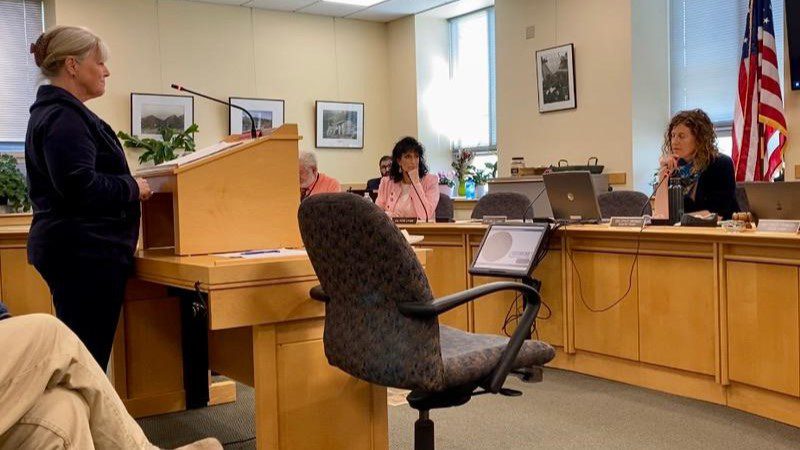A legislative committee tasked with evaluating a slate of mining-related bills made no recommendation on which one(s) to advance after a work session on Thursday, with members insisting they needed more time to weigh the proposals.
The committee voted to table the bill backed by the Maine Department of Environmental Protection and the Natural Resources Council of Maine, LD 1363. Committee Chair Stacy Brenner said it seemed that legislators were “coalescing” around the bill, which has been amended since the committee last considered it.
The amendment, explained DEP Commissioner Melanie Loyzim, would create a “risk-based” exclusion in the state’s metallic mining law. If a developer could prove that they could get a deposit out of the ground without polluting the surrounding land and water, the operation would be excluded from the Metallic Mineral Mining Act and instead likely be regulated under the state’s quarrying rules, which are much less stringent.
Chemical processing of a material would still be regulated under the mining act, which has strict standards for treating mine waste, known as tailings, that can be one of the most environmentally hazardous parts of an operation.
The DEP worked on the amendment to LD 1363 with the Natural Resources Council of Maine and Mary and Gary Freeman, whose discovery of the world’s richest lithium deposit, the news of which the Monitor broke in 2021, prompted the wave of proposed legislation. The Freemans initially opposed the DEP bill, supporting others that would exempt spodumene, the mineral they want to excavate, from the mining law altogether.
Amending the mining act would take time, said Loyzim, since it would be considered a major substantive change, and would require public hearings and legislative approval. The earliest that process might be wrapped up is at the end of 2024. That timeframe didn’t sit well with Mary Freeman, who was at the hearing on Thursday.
“We would have to live with it if that’s what it is,” said Freeman. “But I just don’t understand why extracting spodumene from Plumbago North gets singled out for special rulemaking… if I extracted the spodumene and wanted to use it as road fill I would be allowed to do it now.”
The couple has already spent five years trying to develop the deposit, said Freeman. “Putting all this regulation on something that doesn’t require it is an extra stress.”
Lawmakers were sympathetic to the Freemans’ desire to begin extracting the rock as soon as possible, but said they were trying to anticipate handling requests to dig out other critical minerals and metals, not just the lithium-bearing rocks in Newry.
“We have to think of what somebody else might do down the line,” said Rep. Vicki Doudera.
The state has a number of deposits of crystals that could be similar to the ones in Newry, as well as rare earth elements and the country’s largest reserves of manganese.
“Maine is very unusual in the United States as a whole in having such a diversity of critical mineral deposits and potential for them,” geologist John Slack told the Monitor last month.
The amended bill presented this week would allow developers who can prove they wouldn’t generate pollution to dig for metal-bearing rocks in open pits of up to 10 acres at any one time. That’s down from the 100 acres initially proposed, but up from the 3 acres allowed under current law. “One hundred acres may have been a typo,” said Loyzim.
No changes are being proposed to the state’s quarry law, which has no limits on the size of the open pit, a fact that seemed to surprise some lawmakers. Quarry operators are required to notify the department every time they open an additional 10 acres, said DEP mining coordinator Michael Clark, but there is no limit on the size of the quarry pit they can have open at any one time.
Clark did not have numbers on hand for the average size of a quarry in Maine when asked by the Monitor a few months ago, but said the state’s largest permitted quarry is Poland Quarry in Poland, which is permitted for up to 345 acres, with 75 currently open. The largest open quarry is Dragon Quarry in Thomaston, which has 120 acres open.
Freeman said the couple would need 10 acres at most to conduct their operation.
The Natural Resources Council of Maine, who many lawmakers look to for guidance on environmental issues, is supportive of the latest bill with its amendments.
Nick Bennett, the group’s staff scientist, said that while it’s likely these types of deposits do pose a lower risk than silver or gold mining, “we have very little experience with these types of deposits in Maine, and we certainly don’t have experience with them at scale.”
The rulemaking process will allow for the state to consider the “range of possible scenarios,” said Bennett.
DEP Commissioner Loyzim said the department is trying to avoid making laws based on the metal of the moment.
“When we did the work on the [Metallic Mineral Mining Act],” said Loyzim, “everybody was talking about gold and silver. And so, you know, we created a law and a rule that was designed with golden and silver in mind. And then all of a sudden now we have lithium to consider. And so we’re trying to think much more broadly this time about constructing this in a way that, you know, plug and play any scenario, we should be able to come up with a clear answer of whether or not you’re subject to the Act.”
To read the full edition of this newsletter, see DEP proposes “risk-based” approach to metal mining.
Kate Cough covers climate change and the environment for The Maine Monitor. Reach her with story ideas by email: gro.r1755055256otino1755055256menia1755055256meht@1755055256etak1755055256.







